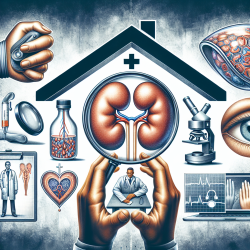Introduction
Protein C (PC) deficiency is a rare but significant risk factor for thromboembolic events, including strokes, especially in young adults. As a naturally occurring anticoagulant, PC plays a crucial role in maintaining the balance between coagulation and anticoagulation in the body. Its deficiency can predispose individuals to various thrombotic conditions, including myocardial infarction, deep venous thrombosis, pulmonary embolism, and stroke.
Pathophysiology and Inheritance
PC is a vitamin K-dependent glycoprotein produced by the liver. It circulates in the blood as an inactive zymogen and is activated by the thrombin-thrombomodulin complex. The activated form of PC (APC) inactivates coagulation factors Va and VIIIa, thus preventing excessive clot formation. The deficiency of PC, whether homozygous or heterozygous, disrupts this balance, leading to a hypercoagulable state.
PC deficiency is an autosomal dominant disorder, with two main types of mutations: type I (quantitative deficiency) and type II (qualitative deficiency). Homozygous PC deficiency is rare and often results in severe conditions like neonatal purpura fulminans.
Clinical Implications
The deficiency of PC is associated with an increased risk of venous thromboembolism (VTE) and, to a lesser extent, arterial thromboembolism (ATE). While VTE is more common, the exact role of PC deficiency in ATE, such as stroke, remains controversial. However, several studies have suggested a potential link between inherited thrombophilias, including PC deficiency, and arterial ischemic stroke.
Diagnosis of PC deficiency involves a thorough clinical evaluation and assays to measure PC levels and activity. Molecular genetic testing can confirm the diagnosis by detecting mutations in the PROC gene.
Management Strategies
Management of PC deficiency primarily involves anticoagulant therapy to prevent thrombotic events. Commonly used anticoagulants include heparin, warfarin, aspirin, and clopidogrel. In cases of severe deficiency, PC concentrate may be administered. The American Society of Hematology recommends PC concentrate over anticoagulants for treating purpura fulminans in homozygous PC deficiency.
Patient counseling is essential to improve medication compliance and reduce recurrence rates. Healthcare professionals should also consider family history and other risk factors when managing patients with PC deficiency.
Encouraging Further Research
Despite the existing knowledge, there is a need for more extensive studies to explore the relationship between PC deficiency and arterial thromboembolic events. Practitioners are encouraged to stay updated with the latest research and consider participating in or supporting studies that further investigate this association.
To read the original research paper, please follow this link: Protein C Deficiency as a Risk Factor for Stroke in Young Adults: A Review.










